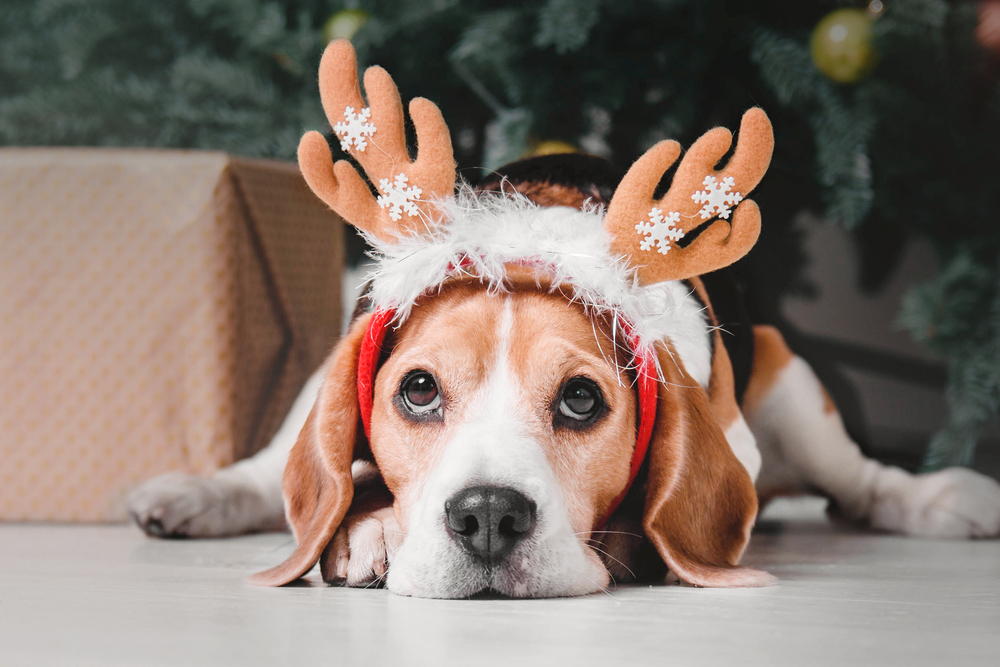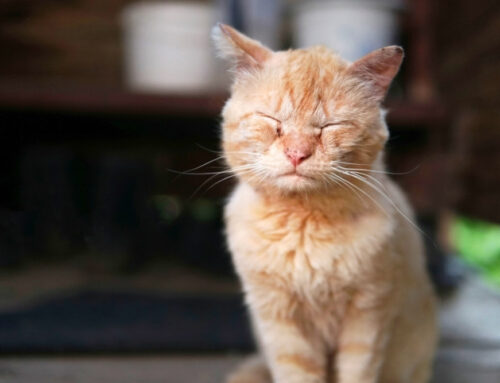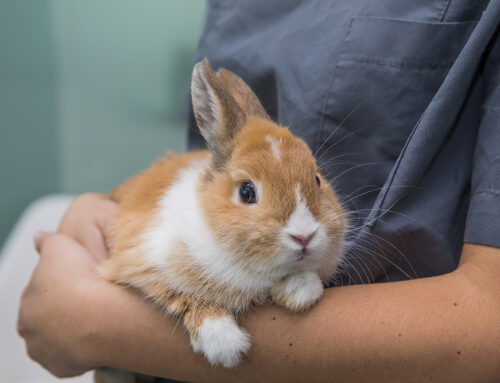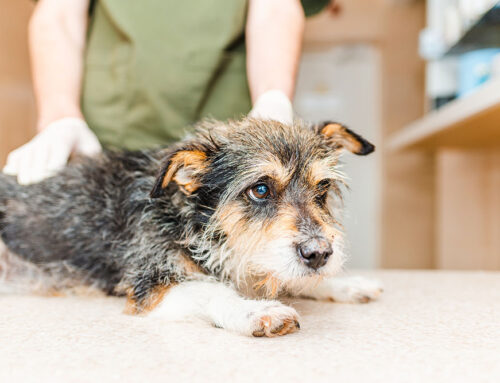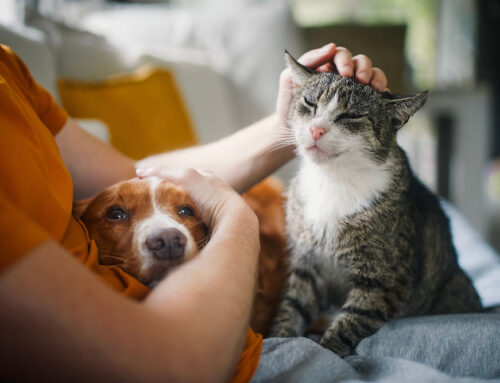No matter how much we sing about peace, joy, and silent nights, the holidays can be anything but—especially for our pets. Learn how to protect your furry friend with Parker Center Animal Clinic’s guide to the 12 pet hazards of Christmas.
#1: Holiday foods and pets
Whether it’s savory or sweet, food is literally everywhere during the holidays, and pet-toxic ingredients are around every corner, so you must supervise your pet in the kitchen, and ensure guests know not to share from their plate.
Stay alert for these toxic ingredients:
- Onions and garlic
- Grapes and raisins
- Chocolate (e.g., cocoa powder, baking, bittersweet, and dark formulations)
- Macadamia nuts
- Xylitol
The following foods can also cause serious or life-threatening harm:
- Bread dough
- Meat bones
- Turkey trimmings, skin, or fat
- Salty, sugary, or high-fat foods
- Dairy products
- Alcohol
- Caffeine
Should your pet consume something toxic or harmful, contact Parker Center Animal Clinic during normal business hours, or call the ASPCA Animal Poison Control Center to consult with a veterinary toxicologist.
#2: Guests and pets
Holiday guests can overwhelm nervous or sensitive pets. Advise guests to let your pet approach them for attention and to leave alone pets who are sleeping, eating, eliminating, or playing with a toy. Provide your pet with a safe retreat (e.g., a spare bedroom, a covered crate) to get away from the noise and activity.
If your pet is easily stressed by environment or routine changes, talk to your veterinarian about anti-anxiety medication.
#3: The holiday tree and pets
Some pets can’t resist a holiday tree decorated with sparkling lights and shiny ornaments. But, all that glitters isn’t gold—trees can tip over and trap or injure pets, chewed lights can give an electric shock, and broken ornaments can lacerate paws and gums.
Use a barrier to keep curious pets away from the tree or supervise your pet at all times.
#4: Tinsel, ribbon, and pets
Cats especially are attracted to sparkly tinsel, ribbon, and decorative string that, when chewed, can wrap around a cat’s tongue or be swallowed and lodge in the intestines, which accordion around the object, causing tissue death and requiring life-saving surgery.
#5: Holiday decorations and pets
No matter your holiday traditions, your pet will be eager to help—perhaps a little too eager. Keep these popular decorations out of paws’ reach:
- Candles — Flickering flames can attract playful paws or be tossed about by tails. Keep candles and menorahs on elevated surfaces, or replace them with flameless alternatives.
- Figurines — Manger scenes, Santa’s workshop, and ski villages all look like toys to playful pets. When ingested, non-food items can lead to choking or intestinal blockages.
- Glass ornaments — Shattered pieces can lacerate paw pads and gums.
- Liquid potpourri and essential oils — Seasonal favorites, including cinnamon, citrus, peppermint, pine, and wintergreen, are poisonous to pets.
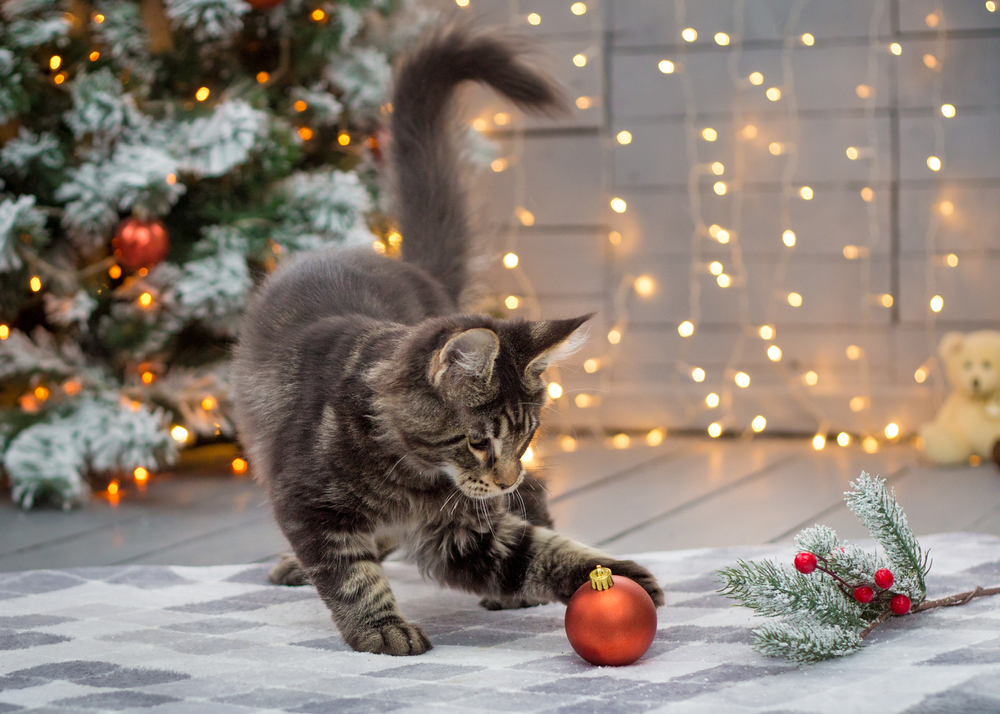
#6: The trash can and pets
Trash cans are technically a year-round hazard, but holiday leftovers and food wrappers make them especially attractive to pets. You’ll often find pets in an upturned trash can consuming harmful items, such as meat bones, foil, plastic wrappers, kitchen twine, and corn cobs, which can all cause life-threatening intestinal blockages.
Empty the trash frequently and keep the bins behind a pet-proof barrier.
#7: Antifreeze and pets
Antifreeze use increases during cold weather, and pets are more exposed to this common toxin. Protect your pet from this sweet-flavored poison by immediately cleaning up antifreeze spills and disposing of any rags. Do not leave your pet unsupervised in a garage or around parked cars.
#8: Travel and pets
Holiday travel is stressful enough for humans, let alone pets. Minimize potential bumps in the road by ensuring your pet wears current identification (e.g., collar and tags, a microchip) and confine them to a crate, carrier, or pet seat belt in the car. If you’ll be flying or staying at a hotel, confirm that your arrangements are pet-friendly and pack an extra copy of your pet’s vaccination records.
#9: Holiday plants and pets
Despite popular belief, poinsettias are not toxic to pets, although ingestion can cause oral irritation and mild gastrointestinal upset. Holiday plants that are toxic include:
- Amaryllis
- Holly and mistletoe
- Yew
- Lilies—All lily parts are extremely toxic to cats and can cause acute kidney failure.
#10: Rawhide treats and pets
Every year around the holidays, major retail stores feature large holiday rawhide displays that, sadly, are not the thoughtful gift that pet owners imagine. Rawhide is manufactured with harsh—often toxic—chemicals, dyes, and preservatives that, undigested, can form sticky blockages in the stomach and intestines, leading to acute illness and requiring emergency surgical removal.
#11: Unsafe pet gifts
Store aisles are filled with festive pet gifts, including squeaky toys, plush characters, rope toys, and chew bones. However, toys are not one-size-fits all. Prevent injury—or expensive surgery—by selecting gifts that match your pet’s playing and chewing style, and always monitoring their behavior.
#12: Pet holiday costumes
You may think your pet would make an adorable elf, but costumes are unnatural and uncomfortable for most pets. If your pet appears stressed or anxious about their holiday costume, opt for a festive collar, bow tie, or bandana.
The Parker Center Animal Clinic team wishes you and yours a happy, healthy, and safe holiday season. Our paw-some team is here to provide your pet with the best veterinary care for the most wonderful time of the year and beyond. Contact us to schedule a visit or book an appointment online.


